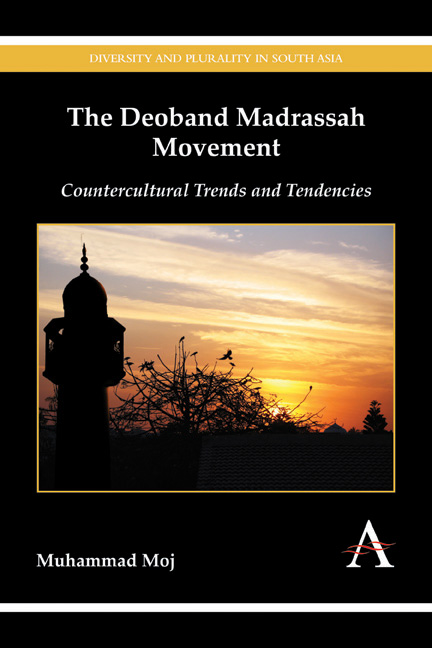Book contents
- Frontmatter
- Dedication
- Contents
- Preface
- Prologue
- Chapter 1 The Deoband Madrassah Movement: Research Context
- Chapter 2 Origin of the DMM: Seeds of a Counterculture
- Chapter 3 The DMM in United India: Activist Countercultural Trends
- Chapter 4 The DMM in Pakistan: Countercultural Politics and Extremism
- Chapter 5 Deobandi Islam: Countering Folk Islam and Popular Custom
- Chapter 6 The DMM versus Mainstream Society: Viewpoints of Deobandi Journals and Students
- Epilogue
- Appendix I The Deobandi Stance vis-à-vis Muslim Groups other than the Barelwis
- Appendix II Countercultural Exposition of the Deobandi Taliban
- Appendix III Interview Guide
- Glossary of Islamic Terms
- References
- Index
Chapter 6 - The DMM versus Mainstream Society: Viewpoints of Deobandi Journals and Students
Published online by Cambridge University Press: 05 December 2015
- Frontmatter
- Dedication
- Contents
- Preface
- Prologue
- Chapter 1 The Deoband Madrassah Movement: Research Context
- Chapter 2 Origin of the DMM: Seeds of a Counterculture
- Chapter 3 The DMM in United India: Activist Countercultural Trends
- Chapter 4 The DMM in Pakistan: Countercultural Politics and Extremism
- Chapter 5 Deobandi Islam: Countering Folk Islam and Popular Custom
- Chapter 6 The DMM versus Mainstream Society: Viewpoints of Deobandi Journals and Students
- Epilogue
- Appendix I The Deobandi Stance vis-à-vis Muslim Groups other than the Barelwis
- Appendix II Countercultural Exposition of the Deobandi Taliban
- Appendix III Interview Guide
- Glossary of Islamic Terms
- References
- Index
Summary
It is an entirely new and different reality that members of a counterculture bear in their minds and seek to embody in social islands that exist in the midst of the rationality of the dominant order.
Kenneth Westhues, Society's Shadow: Studies in the Sociology of Countercultures (1972, 34)This chapter is the outcome of fieldwork in Pakistan that was conducted in two stages. The first stage reviewed the recent Deobandi literature published by different madaris, while the second stage compared the views of students from Deobandi madaris and mainstream educational institutions. Accordingly, the chapter is divided into two parts. Both stages of fieldwork focused on four themes: popular customs and practices, politics, education and the role of women in society. Findings of the fieldwork are discussed below.
Part One: Review of Deobandi Journals
This part of the chapter explores the extent to which the trends identified in the previous chapters are manifest in the journals published by the DMM in Pakistan. The objective of this journals review is to look for countercultural trends vis-à-vis mainstream Muslim society in Pakistan during the last two decades. For this review, the following three prominent monthly journals published by major madaris were selected to represent three of the four provinces of Pakistan (no well-recognized journal from Balochistan has been published long enough for inclusion in this research).
i. Al-Qasim (named after one of the founders of the DMM, Muhammad Qasim)
Published by Jamia Abu Hurairah, Nowshehra, Khyber Pukhtunkhwah Province
ii. As-Sayyanah (The protection)
Published by Jamia Ashrafia, Lahore, Punjab Province
iii. Bayyinat (The clear proofs, named after Chapter 98 of the Quran, Al-Bayyinah)
Published by Jamia-tul-ulum-ul-Islamiyah, Karachi, Sindh Province
As regards the publishing madaris, Jamia Abu Hurairah is located in the small town of Khaliqabad in the district of Nowshehra. It is managed by Abdul Qayyum Haqqani, a renowned Deobandi scholar who graduated from Jamia Haqqania of Akora Khattak in the same district.
- Type
- Chapter
- Information
- The Deoband Madrassah MovementCountercultural Trends and Tendencies, pp. 155 - 194Publisher: Anthem PressPrint publication year: 2015



